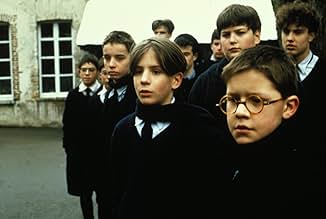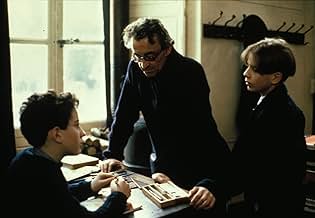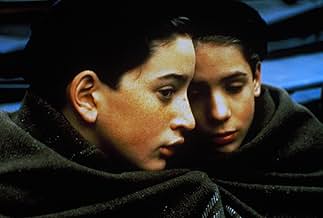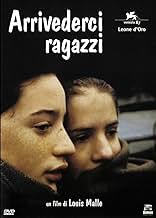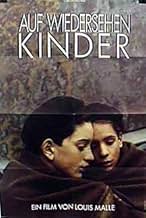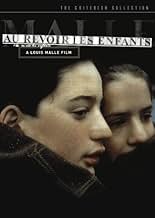IMDb RATING
8.0/10
38K
YOUR RATING
A French boarding school run by priests seems to be a haven from World War II until a new student arrives. Occupying the next bed in the dormitory to the top student in his class, the two yo... Read allA French boarding school run by priests seems to be a haven from World War II until a new student arrives. Occupying the next bed in the dormitory to the top student in his class, the two young boys begin to form a bond.A French boarding school run by priests seems to be a haven from World War II until a new student arrives. Occupying the next bed in the dormitory to the top student in his class, the two young boys begin to form a bond.
- Nominated for 2 Oscars
- 28 wins & 12 nominations total
Stanislas Carré de Malberg
- François Quentin
- (as Stanislas Carré De Malberg)
Luc Etienne
- Moreau
- (as Luc Étienne)
- Director
- Writer
- All cast & crew
- Production, box office & more at IMDbPro
8.038K
1
2
3
4
5
6
7
8
9
10
Featured reviews
"Stop Acting So Pious, There's A War Going On, Kid."
An elegantly crafted tale of friendship, compassion & boyhood, Au Revoir Les Enfants is a heartbreaking, poignant & tragic cinema that's actually based on the events which took place during the childhood of this film's director and is an endearing portrait of life at school, student rivalry & beauty of friendship.
Set in France during the final years of the Second World War, the events of Au Revoir Les Enfants takes place in a Catholic boarding school and is narrated through the eyes of Julien Quentin; one of the students at the school. The plot covers his relationship with a newly arrived enigmatic student with whom he's at odds at first but the two learn to get along & share a big secret.
Directed by Louis Malle, the film is nicely crafted with many details beautifully captured by its calmly moving camera. The screenplay tries to get an authentic vibe of education in Catholic schools, the conversations between its characters carry the childlike innocence & the performances by its cast, especially the child actors, becomes more captivating as the story progresses.
On an overall scale, Au Revoir Les Enfants (also known as Goodbye Children) isn't in anyway a hard-hitting or emotionally scarring cinema but the gentle manner in which it depicts its premise really makes you care for its characters, makes you wish they get away, makes you wish for a miracle & although its subject matter has been dealt in a better manner, the film is worthy of a watch for its two main characters alone.
Set in France during the final years of the Second World War, the events of Au Revoir Les Enfants takes place in a Catholic boarding school and is narrated through the eyes of Julien Quentin; one of the students at the school. The plot covers his relationship with a newly arrived enigmatic student with whom he's at odds at first but the two learn to get along & share a big secret.
Directed by Louis Malle, the film is nicely crafted with many details beautifully captured by its calmly moving camera. The screenplay tries to get an authentic vibe of education in Catholic schools, the conversations between its characters carry the childlike innocence & the performances by its cast, especially the child actors, becomes more captivating as the story progresses.
On an overall scale, Au Revoir Les Enfants (also known as Goodbye Children) isn't in anyway a hard-hitting or emotionally scarring cinema but the gentle manner in which it depicts its premise really makes you care for its characters, makes you wish they get away, makes you wish for a miracle & although its subject matter has been dealt in a better manner, the film is worthy of a watch for its two main characters alone.
Stunning Work of Art
In this spellbinding film, Louis Malle is able to evoke the fear and sadness some children suffer while away from home at a boarding school, the loneliness. Yet he doesn't dwell on sentimentality but only skims it, instead peppering the scenes with the bravura and faux assertiveness of adolescents. Malle and the actors adroitly juggle circumstances and emotions. Ultimately, they capture a terrifying time in history through the eyes and uncertainty of boys who aren't as grown-up as they'd like to think.
The two main characters, Julien Quentin and Jean Bonnet, are beautifully portrayed by two very capable and talented young actors. The supporting cast is equally impressive. The film is directed with a touch of genius, and holds its own when compared to another motion picture masterpiece, To Kill a Mockingbird.
The two main characters, Julien Quentin and Jean Bonnet, are beautifully portrayed by two very capable and talented young actors. The supporting cast is equally impressive. The film is directed with a touch of genius, and holds its own when compared to another motion picture masterpiece, To Kill a Mockingbird.
10Sloke
Lived-in feeling gives sad film great depth
The movie was a project close to Louis Malle's heart (he was in tears when the film premiered at a film festival in 1987) and it shows in the multi-layered treatment he gives the central setting, this fascinating boarding school with its broad cast of characters. Because there are so many different strands and affecting moments tangential to the central plot, one is not entirely prepared for the finale even if you are expecting it. French film is characteristically digressive, often to a fault, but here it works to splendid advantage. It also lends itself to repeat viewings.
I don't think you need to have lived in occupied Europe to appreciate this wonderful film; it speaks to all of us who have lived through childhood's quickly-passing parade and know its lifelong regrets. That last image of the stone wall is emblazoned in many consciousnesses, as it is in mine.
There are many interesting choices Malle makes in this film. For example, while the central subject is the Holocaust, nearly all the Germans we actually see in the film are fairly decent if nonetheless menacing types. The real villains here are almost entirely French collaborators, which was done I think to call attention to collaboration during a period when the French were dealing with the Klaus Barbie trial. [Barbie was a Gestapo officer who was aided in his work rooting out Resistance leaders by many French collaborators.] But casting French people as the heavies also suggests the central evil of prejudice and oppression is not something exclusive to one nationality, and it broadens the scope of the movie.
The tender treatment Malle affords the Catholic hierarchy in the movie is unusual, too, when you see other more anti-clerical Malle efforts like "Murmur of the Heart." There is an unexpected sense of spirituality throughout this film, somewhat muted but there all the same.
This may well stand as the cinematic masterpiece of a man who, at his best (see also "Atlantic City" and "My Dinner With Andre") was to motion pictures what his countrymen Zola and Hugo were to novels: An artist who filled his canvas with the verve and breadth of human life.
I don't think you need to have lived in occupied Europe to appreciate this wonderful film; it speaks to all of us who have lived through childhood's quickly-passing parade and know its lifelong regrets. That last image of the stone wall is emblazoned in many consciousnesses, as it is in mine.
There are many interesting choices Malle makes in this film. For example, while the central subject is the Holocaust, nearly all the Germans we actually see in the film are fairly decent if nonetheless menacing types. The real villains here are almost entirely French collaborators, which was done I think to call attention to collaboration during a period when the French were dealing with the Klaus Barbie trial. [Barbie was a Gestapo officer who was aided in his work rooting out Resistance leaders by many French collaborators.] But casting French people as the heavies also suggests the central evil of prejudice and oppression is not something exclusive to one nationality, and it broadens the scope of the movie.
The tender treatment Malle affords the Catholic hierarchy in the movie is unusual, too, when you see other more anti-clerical Malle efforts like "Murmur of the Heart." There is an unexpected sense of spirituality throughout this film, somewhat muted but there all the same.
This may well stand as the cinematic masterpiece of a man who, at his best (see also "Atlantic City" and "My Dinner With Andre") was to motion pictures what his countrymen Zola and Hugo were to novels: An artist who filled his canvas with the verve and breadth of human life.
Wonderful movie
This movies is one of those movies that you can love, but hate. It makes you hate what happens in the movie. You get so attached to the characters, and when things happen to them, you hate it. But the movie is powerful, wonderfully written and directed by Louis Malle and defiantly should be seen anytime one is studying WWII or the Holocost, or if you have free time, and are looking for a good heart-wrencher. I watched it in French, with subtitles, and that makes it all the better.
Children hide a terrible secret in this film masterpiece
On seeing this movie several years ago my accompanying colleagues said of the film: what a load of self-indulgent, confusing, French stylized rubbish. They bemoaned the slow pace of the film, of the 2 dimensional directing and lack of any action or violent death scenes!
Those words still linger with me now and has made me realise that perhaps a lot of the movie-going public these days feed on the latest sfx pyrotechnics, more ingenious ways of abstract killings, lots of needless sex and not letting a good intelligent story get in the way.
Films like Les Enfants are going to be even more difficult to track down if Hollywood and some of the European studios opt for the fast Buck route to riches.
Les Enfant is a truly wonderful & yet harrowing account of life in a Catholic boys boarding school during the dying embers of the Nazi occupation of France in WW2. One of the new boys happens to be Jewish but the headmaster chooses to keep such identities covert while still offering him sanctuary and an education in spite of all the risks he takes.
To be fair I know little of Louis Malle previous to this film, but I think he must have poured his life's soul into writing & directing Les Enfant.
No detail, harrowing or otherwise, is spared; we see so much beauty amongst the horrors of occupation & collaboration; but also the blossoming relationship between the two lead boys and how initial envy & hatred of the Jew is somewhat diluted by the realities that this is no infantile school game but that life and death for the Jewish boy hangs by a thread if anyone at the school should reveal his true identity.
The final moments are perhaps one of the most sad & dramatic scenes I have ever seen. These days a lot of people would be waiting for some great heroic entrance from a big movie star to sort out all the misery and leave us with a reassurance that "it really wasn't all that bad back then was it".
But there are no heroes at the end of this movie, at least not the kind of heroes Hollywood serves up. The boys in this film are the true heroes right to the very end, primarily for their spirit of humanity in the face of impossible odds.
This is the hard reality of war amongst children growing up not only in the face of their own adolescence (and all the problems that serves), but also with the dark fingered claw of Nazism hanging menacingly like the the Scythe of the Grim Reaper.
This film will move you in so many directions and will hopefully bring you back down to earth from the current Hollywood shallow circus of pap & style-over-content.
Its a difficult film to track down, and the reason for this can be attributed to the first paragraph of this review.
*****/*****
Those words still linger with me now and has made me realise that perhaps a lot of the movie-going public these days feed on the latest sfx pyrotechnics, more ingenious ways of abstract killings, lots of needless sex and not letting a good intelligent story get in the way.
Films like Les Enfants are going to be even more difficult to track down if Hollywood and some of the European studios opt for the fast Buck route to riches.
Les Enfant is a truly wonderful & yet harrowing account of life in a Catholic boys boarding school during the dying embers of the Nazi occupation of France in WW2. One of the new boys happens to be Jewish but the headmaster chooses to keep such identities covert while still offering him sanctuary and an education in spite of all the risks he takes.
To be fair I know little of Louis Malle previous to this film, but I think he must have poured his life's soul into writing & directing Les Enfant.
No detail, harrowing or otherwise, is spared; we see so much beauty amongst the horrors of occupation & collaboration; but also the blossoming relationship between the two lead boys and how initial envy & hatred of the Jew is somewhat diluted by the realities that this is no infantile school game but that life and death for the Jewish boy hangs by a thread if anyone at the school should reveal his true identity.
The final moments are perhaps one of the most sad & dramatic scenes I have ever seen. These days a lot of people would be waiting for some great heroic entrance from a big movie star to sort out all the misery and leave us with a reassurance that "it really wasn't all that bad back then was it".
But there are no heroes at the end of this movie, at least not the kind of heroes Hollywood serves up. The boys in this film are the true heroes right to the very end, primarily for their spirit of humanity in the face of impossible odds.
This is the hard reality of war amongst children growing up not only in the face of their own adolescence (and all the problems that serves), but also with the dark fingered claw of Nazism hanging menacingly like the the Scythe of the Grim Reaper.
This film will move you in so many directions and will hopefully bring you back down to earth from the current Hollywood shallow circus of pap & style-over-content.
Its a difficult film to track down, and the reason for this can be attributed to the first paragraph of this review.
*****/*****
Did you know
- TriviaBased on an incident from Louis Malle's own youth. Julien is modeled after Malle.
- GoofsWhen hiking, Julien asks what day it is and is told that it's Thursday, January 17th, 1944. That date was actually a Monday.
- Crazy creditsPour Cuotemoc, Justine et Chloé. (opening credits)
- How long is Au Revoir les Enfants?Powered by Alexa
Details
- Release date
- Countries of origin
- Official site
- Languages
- Also known as
- Goodbye, Children
- Filming locations
- Production companies
- See more company credits at IMDbPro
Box office
- Gross US & Canada
- $4,542,825
- Gross worldwide
- $4,575,613
- Runtime
- 1h 44m(104 min)
- Color
- Sound mix
- Aspect ratio
- 1.66 : 1
Contribute to this page
Suggest an edit or add missing content

![Watch Bande-annonce [VOST]](https://m.media-amazon.com/images/M/MV5BZDlkMTI5OTgtNmU4My00MzRjLWFkNzMtYmMyMDlhNjQ2OTFmXkEyXkFqcGdeQXRyYW5zY29kZS13b3JrZmxvdw@@._V1_QL75_UX500_CR0)
